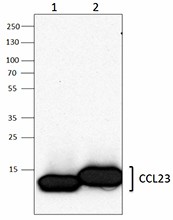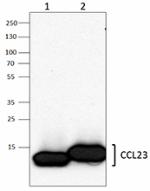- Clone
- A15017A (See other available formats)
- Regulatory Status
- RUO
- Other Names
- Myeloid progenitor inhibitor factor 1 (MPIF-1), Chemokine β-8 (CKβ-8), Macrophage inflammatory protein-3 (MIP-3), MPIF1, MIP3
- Isotype
- Mouse IgG2b, κ
- Ave. Rating
- Submit a Review
- Product Citations
- publications

-

Western blot analysis of Recombinant Human CCL23 (MPIF-1) (Arg46-Asn120) (lane 1), Recombinant Human CCL23 (MPIF-1) (Arg22-Asn120) (lane 2). Anti-CCL23 (MPIF-1) antibody (clone A15017A) was used, followed by HRP Goat anti-mouse IgG (minimal x-reactivity) antibody. Please note that for western blotting, this antibody works only under non-reducing conditions. Please make sure there is no DTT or beta-Mercaptoethanol in your cell lysate or sample buffer.
| Cat # | Size | Price | Quantity Check Availability | Save | ||
|---|---|---|---|---|---|---|
| 684002 | 100 µg | £157 | ||||
Human CCL23 was initially identified in a cDNA library derived from human endothelial cells. CCL23 has six cysteine residues and possesses a separately encoded amino-terminal domain; characteristic of similar chemokines CCL6, CCL9, and CCL15. These four chemokines are weak agonists for CCR1. Nevertheless, they can be proteolytically cleaved in the amino-terminus, resulting in forms with higher chemoattractant activity. Thus, NH2-terminus truncated forms of CCL23 have been detected in synovial fluid of patients with Rheumatoid Arthritis (RA). In vitro studies have shown that CCL23 can be processed by MMPs at the amino and carboxyl terminus. CCL23 (26-99) is the predominant stable form after using MMP1, 2, 3, 7, 8, or 12. CCL23 (30-99) is formed by MMP14, elastase, and proteolytic activity in arthritic synovial fluid. In addition, CCL23 has been detected in serum of patients with active RA, in conjunction with CXCL13, TNFSR9, M-CSF, and TNF-α. High levels in serum of these cytokines correlate with joint inflammation and have been considered to be biomarkers of active RA. Also, high levels of CCL23 have been detected in plasma of atherosclerotic patients. High expression of CCL23 has been found in skin of atopic dermatitis patients, and in mucosal epithelial cells and inflammatory cells in sinonasal tissues of patients with chronic rhinosinusitis (CRS).
Product DetailsProduct Details
- Verified Reactivity
- Human
- Antibody Type
- Monoclonal
- Host Species
- Mouse
- Immunogen
- Recombinant Human CCL23, amino acids Arg46-Asn120 (Accession# P55773.3) was expressed in E. coli.
- Formulation
- Phosphate-buffered solution, pH 7.2, containing 0.09% sodium azide.
- Preparation
- The antibody was purified by affinity chromatography.
- Concentration
- 0.5 mg/ml
- Storage & Handling
- The antibody solution should be stored undiluted between 2°C and 8°C. May be sub-aliquoted and stored at -20°C to avoid multiple freeze thaw cycles.
- Application
-
WB - Quality tested
- Recommended Usage
-
Each lot of this antibody is quality control tested by Western blotting. For Western blotting, the suggested use of this reagent is 0.5 - 2.0 µg/ml. It is recommended that the reagent be titrated for optimal performance for each application.
- Application Notes
-
Please note that for western blotting, this antibody works only under non-reducing conditions. Please make sure there is no DTT or beta-Mercaptoethanol in your cell lysate or sample buffer. This antibody is only tested on recombinant proteins. It may not be able to detect endogenous protein from cell or tissue lysates by western blotting where the expression levels may be too low.
- Product Citations
-
- RRID
-
AB_2616703 (BioLegend Cat. No. 684002)
Antigen Details
- Structure
- 120 amino acids with a predicted molecular weight of approximately 13kD.
- Distribution
-
Monocytes, macrophages, dendritic cells, mucosal epithelial cells, and eosinophils.
- Function
- CCL23 attracts monocytes, dendritic cells, and resting lymphocytes. CCL23 induces endothelial cell migration and angiogenesis. CCL23 inhibits colony formation of bone marrow-derived cells. IL-4 and IL-13 induce CCL23 in peripheral blood monocytes, and GM-CSF synergizes with IL-4 to induce CCL23. GM-CSF and IL-5 induce CCL23 secretion from eosinophils.
- Ligand/Receptor
- CCR1.
- Cell Type
- Monocytes, Macrophages, Dendritic cells, Epithelial cells, Eosinophils
- Biology Area
- Angiogenesis, Cell Biology, Cell Motility/Cytoskeleton/Structure, Immunology, Innate Immunity, Signal Transduction
- Molecular Family
- Cytokines/Chemokines
- Antigen References
-
1. Patel VP, et al. 1997. J. Exp. Med. 185:1163.
2. Macphee CH, et al. 1998. J. Immunol. 161:6273.
3. Hwang J, et al. 2005. Cytokine. 30:254.
4. Berahovich RD, et al. 2005. J. Immunol. 174:7341.
5. Novak H, et al. 2007. J. Immunol. 178:4335.
6. Rioja I, et al. 2008. Arthritis Rheum. 58:2257.
7. Poposki JA, et al. 2011. J. Allergy Clin. Immunol. 128:73.
8. Starr AE, et al. 2012. J. Biol. Chem. 287:5848. - Gene ID
- 6368 View all products for this Gene ID
- UniProt
- View information about CCL23 on UniProt.org
Related Pages & Pathways
Pages
Other Formats
View All CCL23 (MPIF-1) Reagents Request Custom Conjugation| Description | Clone | Applications |
|---|---|---|
| Purified anti-CCL23 (MPIF-1) | A15017A | WB |
Compare Data Across All Formats
This data display is provided for general comparisons between formats.
Your actual data may vary due to variations in samples, target cells, instruments and their settings, staining conditions, and other factors.
If you need assistance with selecting the best format contact our expert technical support team.
-
Purified anti-CCL23 (MPIF-1)

Western blot analysis of Recombinant Human CCL23 (MPIF-1) (A...

 Login / Register
Login / Register 







Follow Us